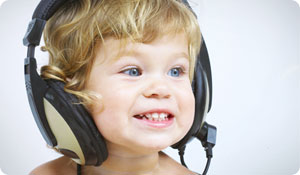
When your child sings along with her favorite song, she's probably enjoying herself a great deal as she exercises her vocal chords. But did you know that engaging in music can also help make her smarter, calmer, and happier, too?
Music Benefits are Widespread
The positive impact that music can have on kids' intelligence, achievements, and even mood, is becoming increasingly recognized. As a result, many pediatricians now recommend that you expose your baby to music from a very early age.
Here's how your child can benefit from listening to music, or making it herself:
1. While you probably know this instinctively (such as when you sing a lullaby to soothe your child to sleep), the latest research reveals that listening to classical music and other popular tunes can help your child relax and generally feel more positive, and confident..
2. Listening to music on a regular basis can help her learn more effectively and be better able to remember information as well. (That's why children often pair things they need to memorize along with a catchy tune.)
3. Learning to play an instrument can teach your child much beyond the basic notes. The focus and discipline involved in such a hobby can carry through to her schoolwork and other parts of her life as well.
4. Studies show that music benefits extend to math and science accomplishments. Researchers credit this to the fact that music promotes a child's ability to reason, process, and understand information, and these skills can transfer to learning other topics.
5. Students who participate in formal music programs have also been found to score higher on the SATs and are more likely to go to college. This may be because music teaches a variety of skills including discipline, concentration, cooperation, and setting goals. These behaviors are essential to success on so many levels.
These and other music benefits should be enough to inspire you to encourage your child to sing, dance, and even learn to play an instrument. The best way to get started is to expose her to a variety of music types and styles. Make time to dance with your child, providing a safe place where she can practice improving her coordination and strength. In addition, help her make up silly songs with facts or information she's learning. This will help with memorization and recall. Also remember that you don't have to go it alone. If your child seems to enjoy musical activities, you may want to sign her up for professional lessons.
Sources:
American Academy of Pediatrics
http://www.healthychildren.org/English/healthy-living/emotional-wellness/pages/Music-and-Mood.aspx
American Music Therapy Association
http://www.musictherapy.org/faqs.html#WHO_CAN_BENEFIT
American Music Therapy Foundation
Kids Health/Nemours Foundation
http://kidshealth.org/parent/growth/learning/preschool_music.html#
http://kidshealth.org/parent/growth/learning/schoolage_music.html?tracking=P_RelatedArticle#
Perkins Center for the Arts
http://www.perkinscenter.org/what_we_offer/Benefits-of-Music-Education





